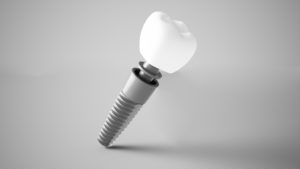 A dental implant is unlike any other treatment because it replaces both the root and the crown. A titanium post, an abutment, and a restoration are used to recreate the entire structure of the tooth. Since the process uses titanium, it’s normal to have concerns about the material rusting in your mouth. There’s no reason to worry because titanium is corrosion-resistant.
A dental implant is unlike any other treatment because it replaces both the root and the crown. A titanium post, an abutment, and a restoration are used to recreate the entire structure of the tooth. Since the process uses titanium, it’s normal to have concerns about the material rusting in your mouth. There’s no reason to worry because titanium is corrosion-resistant.
How a Dental Implant Works
Traditional prosthetics only recreate the portion above the gum line, but a dental implant goes a step further. A titanium post is surgically placed into your jaw to act as a new root. Your bone will fuse to it through a process called osseointegration, allowing it to stay in place forever. It will provide unmatched support and stability for a customized all-ceramic restoration that’s attached using an abutment.
Dental Implants Won’t Rust
Many metals are used in dentistry, but only one is used for dental implants. Titanium is the go-to material for implant posts. It’s durable, lightweight, and biocompatible, but titanium is also corrosion-resistant.
Most metals have iron in them, which oxidizes when exposed to moisture. However, titanium doesn’t contain any iron, so it doesn’t rust. Rust creates iron oxide in the body, which is toxic and can result in an infection. Although iron is necessary to keep your body functioning at its best, oxidized iron is bad news for your health and dental implants.
While your implant posts won’t rust, corrosion can occur over time, in rare cases. Saliva can react with the implant and jawbone, creating tiny electrical pulses. The pulses can corrode your dental implants long-term, which typically occurs after 15 years. Rest assured, the risk of rusting and corrosion is very unlikely.
Get the Most from Your Dental Implants
Dental implants are proven to last for 30 years or longer with the correct aftercare. You can safeguard your new smile from any complications by following a few tips:
- Commit to Your Oral Hygiene: Brush your teeth at least twice daily using a soft-bristled toothbrush and nonabrasive toothpaste. Floss at least once daily. Finish your routine with an antimicrobial mouthwash.
- Practice a Healthy Lifestyle: Eat nutritious foods and limit your consumption of sugars and starches. Don’t smoke or drink a lot of alcohol to lessen your risk of infections.
- Visit Your Dentist Regularly: Besides caring for your smile at home, visit your dentist every 6 months for a cleaning and checkup.
You’ll never have to worry about replacing your lost teeth ever again by giving your smile the attention it deserves.
About Dr. Nicholas Brong
Dr. Brong achieved his dental degree at the University of California in San Francisco. He has regularly continued his education in many specialties, including tooth extractions, dental implants, and periodontal therapy. He is a proud member of the American Dental Association and several additional professional organizations. Request an appointment online or call (507) 322-1210.





